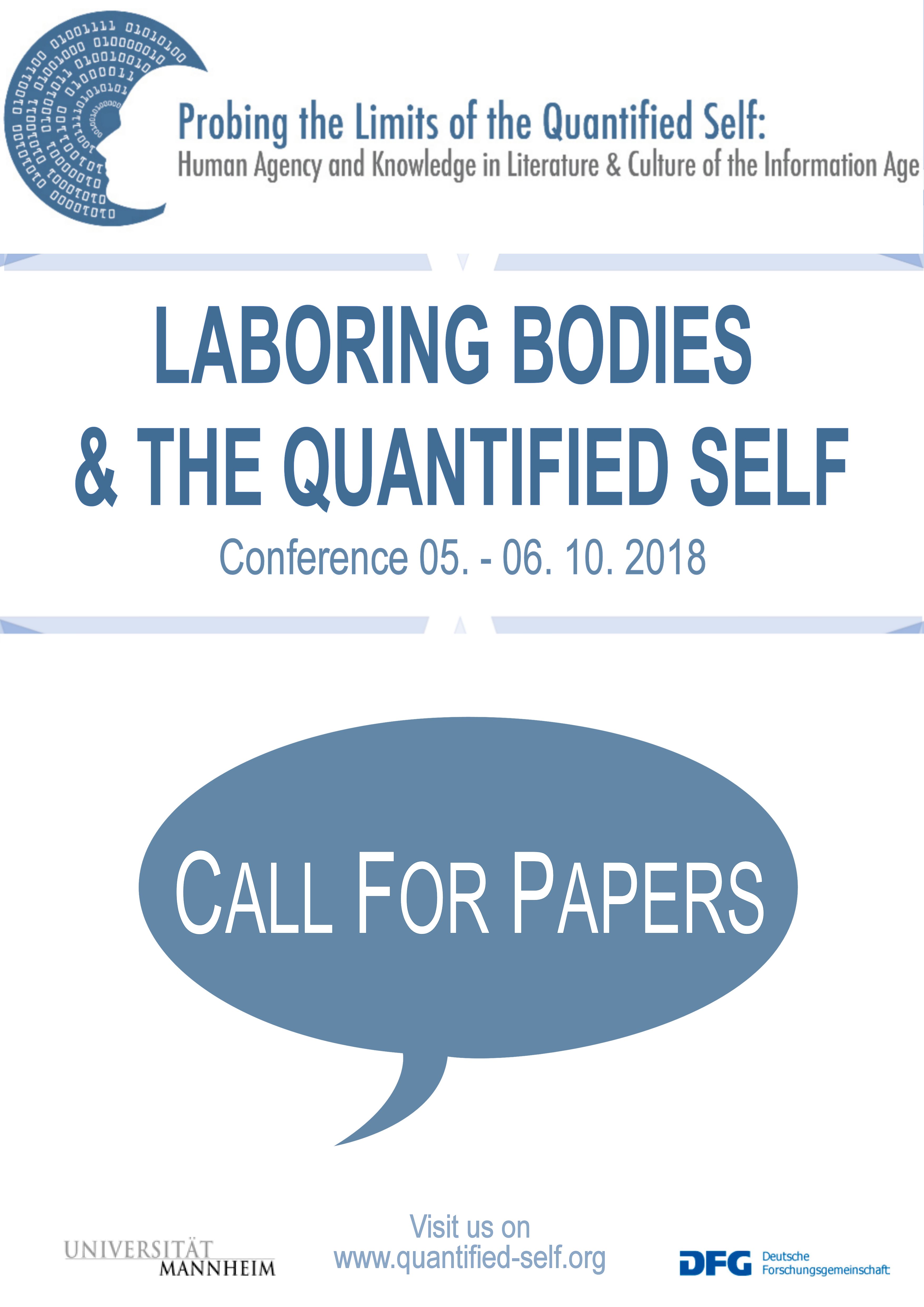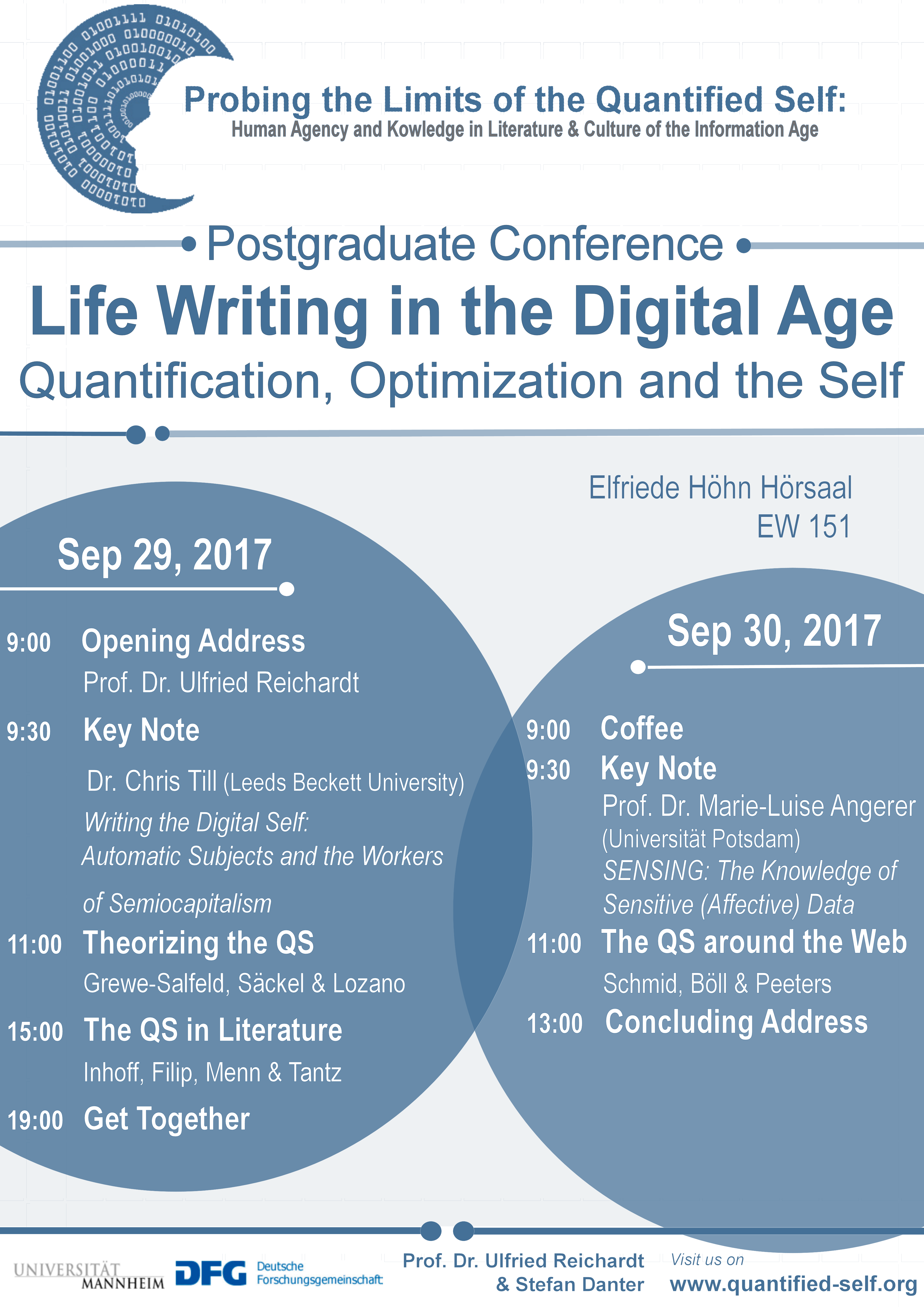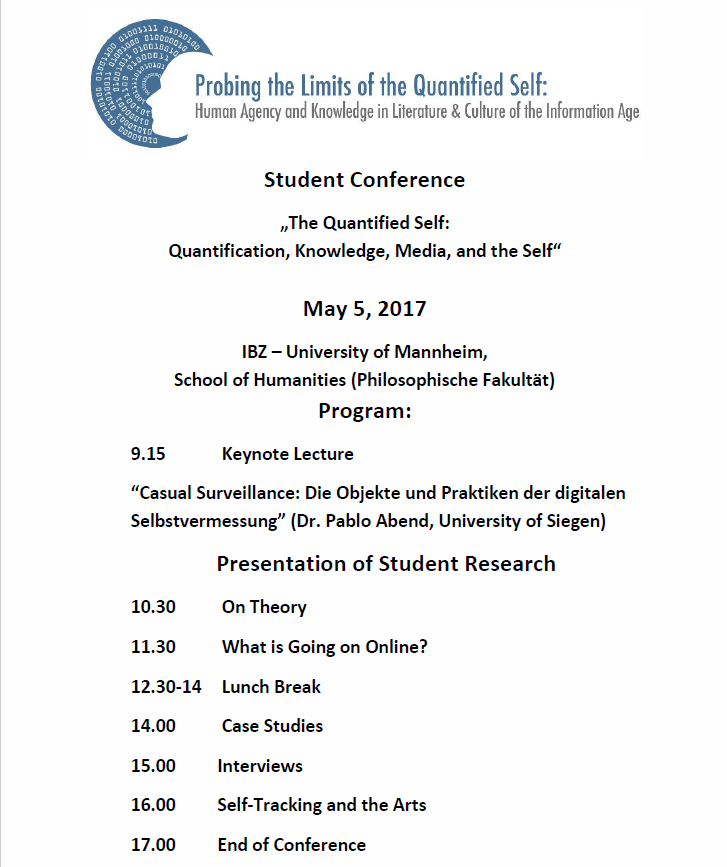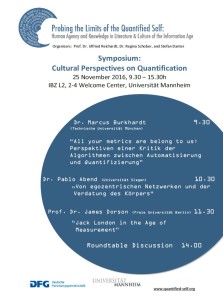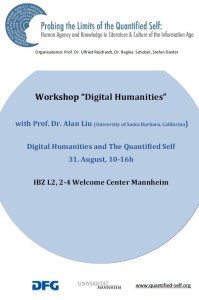Laboring Bodies & the Quantified Self Conference Agenda
Call for Papers: Laboring Bodies and the Quantified Self
University of Mannheim, Oct 5-6, 2018
The body has become central to practices of self-tracking and self-improvement. Quantifying the self, for example by counting steps, calories, tracking sleep patterns, heart rate, blood pressure etc., aims at optimizing the body. Moreover, new technologies have made it easier and thus more pervasive to monitor, analyze, and control the body as a project. Although self-improvement through quantification can serve to enhance physical performance and well-being, many users are unaware of the economic value of their data. While providing access to a deeper knowledge of the self, our own data and by extension, our bodies, are turned into a commodity, particularly when data is correlated to create specific marketing profiles or when quantification is used to adjust bodies to normative standards. This quantified data of the self is instrumental in unlocking the body’s potential as a laboring body, and in turn, disciplining the individual according to market demands and biopolitical agendas. In this conference, we want to draw critical attention to the role that the laboring body plays in practices, discourses, and literary as well as other cultural representations of the quantified self. Moreover, we want to shed light on the ways that data collection and production redefine what passes as labor, including notions of immaterial and free labor in an increasingly virtual work environment. We invite abstracts that address but are not limited to the following questions:
What function does quantification have in conceptualizing the body as a laboring body?
How does quantification contribute to disciplining the body?
How have practices of self-tracking, self-monitoring, and self-optimization evolved historically?
How does literature contribute to the redefinition of the laboring body in the context of self-quantification?
What are the specific benefits of literature in imagining, reflecting on, and negotiating the implications of self-tracking practices on the individual and society?
What can an American Studies perspective contribute to the discourse on the quantified self as a laboring body?
Please send abstracts of no more than 350 words to adrei@rumms.uni-mannheim.de by May 15, 2018.
This conference is part of the DFG project ‘Probing the Limits of the Quantified Self: Human Agency and Knowledge in Literature and Culture of the Information Age’
Conference organizers: Prof. Dr. Ulfried Reichardt, Dr. Regina Schober, Stefan Danter, Juliane Strätz
Invitation: Postgraduate Conference
The Department of North American Studies of the University of Mannheim and the research project “Probing the Limits of the Quantified Self” are pleased to announce the program for the postgraduate conference Life Writing in the Digital Age: Quantification, Optimization and the Self. The event will take place on the 29-30 September 2017 at the Mannheim University campus.
This conference will give higher degree research candidates the opportunity to showcase their current projects, as well as provide a forum to discuss contemporary issues, problems, and opportunities concerning the practice of quantification.
Click here for detailed information about the topics of the conference.
The program is comprised of two comprehensive days of specialized key note addresses and panel discussions.
Anyone interested in this topic is cordially invited to attend.
Student Conference: The Quantified Self: Quantification, Knowledge, Media, and the Self
Call for Papers: Life Writing in the Digital Age: Quantification, Optimization and the Self
Postgraduate Conference in Mannheim, September 29-30 2017
Deadline: June 30, 2017
The research project “Probing the Limits of the Quantified Self – Human Agency and Knowledge in Literature & Culture of the Information Age,” funded by the German research association (DFG), invites scholars to submit proposals for its postgraduate conference – Life Writing in the Digital Age: Quantification, Optimization and the Self. The conference will be held at the University of Mannheim on September 29-30, 2017.
Recent years have seen a surge in the popularity and proliferation of life writing, both in terms of academic analysis and the sheer number of readers interested in the material. At least one reason for this can be found in the way digital technology has changed how subjects communicate, think, and of course also consume products of literary or artistic imagination. The continued spread and improvement of smart devices such as smart phones, tablets, or smart watches, paired with the constantly advancing quality and availability of high speed internet has created a situation in which “life writing” can no longer be understood solely on literary terms. Contemporary subjects record their experiences via video, photo, text, and even emojis, and new studies of “writing” thus need to account for the popularity of vlogs, blogs, and “stories”, the new feature in popular apps such as Instagram, Snapchat, and WhatsApp that lets users record, upload, and share moments that will automatically – and supposedly permanently – be deleted within 24 hours. Another influential factor is the general trend towards ever increasing efficiency, optimization, and control that can be tied to both the economy of the Information Age and the prevalence of neoliberal ideals of subjectivity. The so called “Quantified Selves” emerging from this context are commonly characterized as subjects that utilize quantitative methods to track every aspect of their lives and bodies in order to build a better version of themselves. According to this logic, every human being can playfully track, control, and maximize their experience of life with the help of smart devices. These are often infused with gratification mechanics adopted from video games, sparking debates about the “gamification” of tracking and its effects. Ultimately, so the argument goes, the “truth” about the self can only be accessed through numbers and data and not by mere reflection or introspection. The goal of this conference is to analyze and question how a belief in the absolute truth and rationality of numerical data changes both the way subjects think about themselves and the way they choose to record and express their experience of the world.
We invite abstracts focusing on any of the topics proposed below (without being restricted to these):
- Theories of Quantification and the Quantified Self
- Apps and Gamification Processes
- Video Game Studies
- Digital Life Writing
- Life Writing
- Blogs, Vlogs, E-Journals, Streams, Personal Websites
- Aesthetics of Data/Quantification
- Body Image and Self-Tracking
- Body Optimization
Abstracts should be submitted by June 30th. Please include the following in your submission:
- Name
- Affiliation (if any)
- Email Address
- Title of Abstract
- Abstract (300 words)
Please send emails to sdanter[at]uni-mannheim.de
Guest Lecture , Ramón Reichert, November 15, 2016
Guest Lecture “Big Data Culture: Zur Konstruktion von großen Datenmengen”
By Ramón Reichert (Donau-Universität Krems, Austria)
On Tuesday, 15 November, 2016
5.15 pm – 6.45 pm
Room EW163, University of Mannheim
Symposium “Cultural Perspectives on Quantification” , 25 November, 2016
Workshop – Digital Humanities, 31 August, 2016
On Wednesday, August 31, a workshop with Alan Liu from the University of California, Santa Barbara, concerning Digital Humanities as well as the Quantified Self will take place at Mannheim University.
European Society for Literature, Science and The Arts, June 14-17, 2016
During the European Society for Literature, Science and The Arts, June 14-17, 2016, Ulfried Reichardt and Stefan Dater both took part in the program with papers concerning the Quantified Self.
Ulfried Reichard participated with a paper titled “Control, the Quantified Self-Movement, and Contemporary Fiction: Zero and The Circle”.
Stefan Danter presented the paper ”Command and Control: The Quantified Self and Biomedical Posthumanism”.


